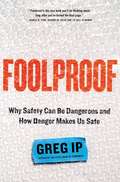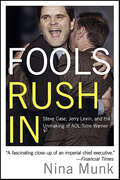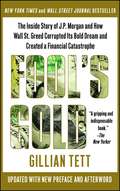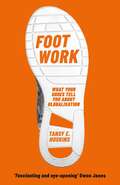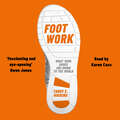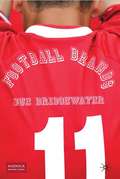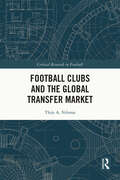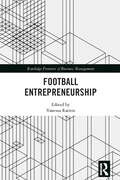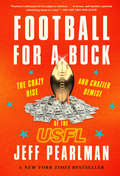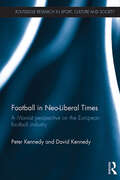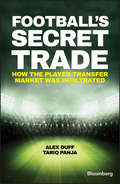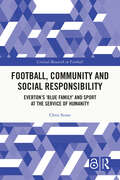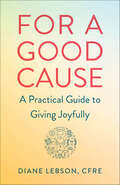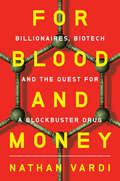- Table View
- List View
Foolproof: Why Safety Can Be Dangerous and How Danger Makes Us Safe
by Greg IpHow the very things we create to protect ourselves, like money market funds or anti-lock brakes, end up being the biggest threats to our safety and wellbeing. We have learned a staggering amount about human nature and disaster -- yet we keep having car crashes, floods, and financial crises. Partly this is because the success we have at making life safer enables us to take bigger risks. As our cities, transport systems, and financial markets become more interconnected and complex, so does the potential for catastrophe.How do we stay safe? Should we? What if our attempts are exposing us even more to the very risks we are avoiding? Would acceptance of danger make us more secure? Is there such a thing as foolproof? In FOOLPROOF, Greg Ip presents a macro theory of human nature and disaster that explains how we can keep ourselves safe in our increasingly dangerous world.
Fools Rush In: Steve Case, Jerry Levin, and the Unmaking of AOL Time Warner
by Nina MunkA carefully explained business debacle.
Fools Rush In: Steve Case, Jerry Levin, and the Unmaking of AOL Time Warner
by Nina MunkEvery era has its merger; every era has its story. For the New Media age it was an even bigger disaster: the AOL-Time Warner deal. At the time AOL and Time Warner were considered a matchless combination of old media content and new media distribution. But very soon after the deal was announced things started to go bad—and then from bad to worse. Less than four years after the deal was announced, every significant figure in the deal -save the politically astute Richard Parsons—has left the company, along with scores of others. Nearly a $100 billion was written off and a stock that once traded at $100 now trades near $10.What happened? Where did it all go wrong? In this deeply sourced and deftly written book, Nina Munk gives us a window into the minds of two of the oddest men to ever run billion-dollar empires. Steve Case, the boy wonder who built AOL one free floppy disk at a time, was searching for a way out of the New Economy. Meanwhile Jerry Levin, who'd made his reputation as a visionary when he put HBO on satellite distribution, was searching for a monumental deal. These two men, more interested in their place in history than their personal fortunes, each thought they were out-smarting the other.
Fool’s Gold: How the Bold Dream of a Small Tribe at J. P. Morgan Was Corrupted by Wall Street Greed and Unleashed a Catastrophe
by Gillian TettFrom award-winning Financial Times journalist Gillian Tett, who enraged Wall Street leaders with her newsbreaking warnings of a crisis more than a year ahead of the curve, Fool's Gold tells the astonishing unknown story at the heart of the 2008 meltdown.
Foot Work: What Your Shoes Are Doing to the World
by Tansy E. HoskinsFrom the author of STITCHED UP: 'Makes a strong case for nothing less than a revolution' Emma Watson'A superb primer on everything that is wrong with our world - and how we can start to change it' NEW INTERNATIONALISTDO YOU KNOW WHERE YOUR SHOES COME FROM?DO YOU KNOW WHERE THEY GO WHEN YOU'RE DONE WITH THEM?In 2018, 66.3 million pairs of shoes were manufactured across the world every single day. They have never been cheaper to buy, and we have never been more convinced that we need to buy them. Yet their cost to the planet has never been greater.In this urgent, passionately argued book, Tansy E. Hoskins opens our eyes to the dark origins of the shoes on our feet. Taking us deep into the heart of an industry that is exploiting workers and deceiving consumers, we begin to understand that if we don't act fast, this humble household object will take us to the point of no return.
Foot Work: What Your Shoes Are Doing to the World
by Tansy E. HoskinsFrom the author of STITCHED UP: 'Makes a strong case for nothing less than a revolution' Emma Watson'A superb primer on everything that is wrong with our world - and how we can start to change it' NEW INTERNATIONALISTDO YOU KNOW WHERE YOUR SHOES COME FROM?DO YOU KNOW WHERE THEY GO WHEN YOU'RE DONE WITH THEM?In 2018, 66.3 million pairs of shoes were manufactured across the world every single day. They have never been cheaper to buy, and we have never been more convinced that we need to buy them. Yet their cost to the planet has never been greater.In this urgent, passionately argued book, Tansy E. Hoskins opens our eyes to the dark origins of the shoes on our feet. Taking us deep into the heart of an industry that is exploiting workers and deceiving consumers, we begin to understand that if we don't act fast, this humble household object will take us to the point of no return.
Foot Work: What Your Shoes Tell You About Globalisation
by Tansy E. HoskinsFrom the author of STITCHED UP: 'Makes a strong case for nothing less than a revolution' Emma Watson'A superb primer on everything that is wrong with our world - and how we can start to change it' NEW INTERNATIONALISTDO YOU KNOW WHERE YOUR SHOES COME FROM?DO YOU KNOW WHERE THEY GO WHEN YOU'RE DONE WITH THEM?In 2018, 66.3 million pairs of shoes were manufactured across the world every single day. They have never been cheaper to buy, and we have never been more convinced that we need to buy them. Yet their cost to the planet has never been greater.In this urgent, passionately argued book, Tansy E. Hoskins opens our eyes to the dark origins of the shoes on our feet. Taking us deep into the heart of an industry that is exploiting workers and deceiving consumers, we begin to understand that if we don't act fast, this humble household object will take us to the point of no return.(p) The Orion Publishing Group Ltd 2020
Football Against The Enemy: Football Against The Enemy
by Simon KuperThe classic winner of the William Hill Sports Book of the Year Award'None matches this global examination for originality, breadth and sheer courage' MAIL ON SUNDAY'If you like football, read it. If you don't like football, read it' THE TIMESThroughout the world, football is a potent force in the lives of billions of people. Focusing national, political and cultural identities, football is the medium through which the world's hopes and fears, passions and hatreds are expressed. Simon Kuper travelled to 22 countries from South Africa to Italy, from Russia to the USA, to examine the way football has shaped them. At the same time he tried to find out what lies behind each nation's distinctive style of play, from the carefree self-expression of the Brazilians to the anxious calculation of the Italians. During his journeys he met an extraordinary range of players, politicians and - of course - the fans themselves, all of whom revealed in their different ways the unique place football has in the life of the planet.
Football Brands
by Sue BridgewaterThe media increasingly refer to football clubs as brands. Certainly concepts such as loyalty, affiliation, emotional ties with football clubs seem to parallel the relationship between consumer and brand in the broader marketing sphere. This book delves deep into the world of the lucrative business of sports branding.
Football Club Management: Insights from the Field (Routledge Research in Football)
by Ian LawrenceThe rapid global growth of the sport industry has prompted the need for a more commercial approach to the management of sport clubs. This book is the first study of its kind to focus on the management of professional football clubs, providing a real-world insight into management principles and their practical application. The international commercialisation of football has led to a fundamental transformation of the industry’s management practices, given the financial rewards of success and the high price of failure. This book presents a critical examination of this transformation, questioning why clubs are increasingly adopting management strategies from other industries. Each chapter analyses the role played by a key leadership figure within a club, such as the owner, chief executive officer (CEO), chief financial officer (CFO), chief operating officer (COO), director of football (DoF), and head coach. Full of exclusive interviews, case studies and examples of best practice, this book sheds new light on the challenges of working in this extraordinarily high-pressure environment. Football Club Management: Insights from the Field is fascinating reading for all those working in or studying the management, marketing or administration of football.
Football Clubs and the Global Transfer Market (Critical Research in Football)
by Thijs A. VelemaThis is the first book to examine labour markets in professional football from the perspective of football clubs rather than players. Drawing on data from the eight biggest European football leagues – the hub of the global player transfer market – the book explores how and why clubs scout the market for new players, why they let players go, and how they use their academies to identify and develop young talent. Arguing that clubs aren’t fully rational actors when it comes to player transfers and talent development, it demonstrates that clubs’ talent policy is most often a bet on high player turnover alongside local recruitment. It shows that most transfers take place domestically between clubs within country borders, using sociological analysis to explore the investment of clubs in domestic labour markets, and offers new insight into the internal operation of clubs in the way that they manage their first team squads and youth academies, and how this often creates conditions of anxiety and insecurity that isn’t in the best interests of clubs or players. International in scope, and shining new light on sports labour markets and organisational behaviour in sport, this book is fascinating reading for any advanced student, researcher, policy-maker or practitioner with an interest in sport business and management, talent identification and development, or international business or human resource management.
Football Entrepreneurship (Routledge Frontiers of Business Management)
by Vanessa RattenFootball is the world’s most popular sport and is entrepreneurial by nature. There is a constant need for entities and individuals involved with football to act or behave in an entrepreneurial way. Competition is part of the football industry and emphasises the need to compete but also collaboration through entrepreneurial endeavours. This book is amongst the first to focus specifically on football entrepreneurship and the entrepreneurial nature of football. The book looks at entrepreneurship and how it can occur through direct and indirect engagement with football in a variety of contexts. It examines different types of football including gridiron, rugby and soccer and offers insights on the international aspects of football and how cultural aspects influence entrepreneurship. This book provides a holistic understanding of how football can include innovation, risk taking and proactive activity and will be useful for those interested to learn more of the football industry and entrepreneurship in the global context.
Football and Management: Comparisons between Sport and Enterprise
by Sten SödermanWhat happens off the football pitch? This volume mixes storytelling with theoretical and conceptual reasoning to analyse marketing, product, product development and management, as well as (in football terms), the atmosphere, match, training and club management.
Football and Social Sciences in Brazil
by Sérgio Settani Giglio Marcelo Weishaupt ProniThis book presents a kaleidoscopic view of the multidisciplinary field of research developed within Brazilian social sciences to study football as a major cultural and social phenomenon in the country. As a contributed volume, it brings together chapters authored by researchers from different disciplines, such as sociology, anthropology, political science, history, geography, economy, communication studies and physical education, who contributed to make Brazilian football a multifaceted object of study for the human and social sciences. The book is divided in four parts. The first two parts are dedicated to the "classic" areas, in which the best known research lines are concentrated: part one focuses on politics and history, while part two is dedicated to sociology and anthropology. The third part brings together studies from other four different areas: communication studies, geography, economy and physical education. The fourth part is organized not by disciplines, but around transversal themes, such as gender, violence, fans and racism. The varied approaches and different interpretations brought together in this book seek to provide an overview of the fertile academic debate that has stimulated the renewal of scientific research on football in Brazil, which makes Football and Social Sciences in Brazil a useful resource for researchers from different disciplines within the human and social sciences interested in the study of football as major cultural and social phenomenon all over the world.
Football for a Buck: The Crazy Rise and Crazier Demise of the USFL
by Jeff PearlmanFrom a multiple New York Times bestselling author, the rollicking, outrageous, you-can’t-make-this-up story of the USFL The United States Football League—known fondly to millions of sports fans as the USFL—was the last football league to not merely challenge the NFL, but cause its owners and executives to collectively shudder. It spanned three seasons, 1983-85. It secured multiple television deals. It drew millions of fans and launched the careers of legends. But then it died beneath the weight of a particularly egotistical and bombastic owner—a New York businessman named Donald J. Trump. The league featured as many as 18 teams, and included such superstars as Steve Young, Jim Kelly, Herschel Walker, Reggie White, Doug Flutie and Mike Rozier. In Football for a Buck, the dogged reporter and biographer Jeff Pearlman draws on more than four hundred interviews to unearth all the salty, untold stories of one of the craziest sports entities to have ever captivated America. From 1980s drug excess to airplane brawls and player-coach punch outs, to backroom business deals, to some of the most enthralling and revolutionary football ever seen, Pearlman transports readers back in time to this crazy, boozy, audacious, unforgettable era of the game. He shows how fortunes were made and lost on the backs of professional athletes and also how, thirty years ago, Trump was a scoundrel and a spoiler. For fans of Terry Pluto’s Loose Balls or Jim Bouton’s Ball Four and of course Pearlman’s own stranger-than-fiction narratives, Football for a Buck is sports as high entertainment—and a cautionary tale of the dangers of ego and excess.
Football in Neo-Liberal Times: A Marxist Perspective on the European Football Industry (Routledge Research in Sport, Culture and Society)
by Peter Kennedy David KennedyThis book offers an original Marxist critique of the European football business. It argues that the Marxist account of the difference between profits and surplus value is crucial to an understanding of the fluid and contradictory nature of the commodification of football. Section one analyses the nature of modern professional football and section two highlights attempts, via government agency and football clubs, to corral fans into ever greater identification with business logic aimed at breaking traditional social relations. Section three draws on a number of cases studies across Europe, to analyse how some fans are attempting to mount a counter ideological response to the assault of neo-liberalism on the game.
Football in the Nordic Countries: Practices, Equality and Influence (Critical Research in Football)
by Mihaly Szerovay Arto Nevala Hannu ItkonenThis book explores football culture, organisation and development in the five Nordic countries: Denmark, Finland, Iceland, Sweden and Norway. These countries represent an important case study in sport culture, policy and management, being shaped by unique traditions in their civil society and in social welfare and public policy. The first part of the book explores the development path of football in each country, looking at how football arrived in Scandinavia and how it has been transformed from a voluntary civic activity into a professional sport while becoming closely attached to the global football system. The second part highlights key issues – including historical, contemporary and critical aspects – across three themes: professionalisation and changing practices; equality and gender; and supporters, audiences and culture. Written by a team of authors with a blend of experience as academics and practitioners in football, the book traces the contours of the distinctive Nordic model that occupies a prominent position in the global football system. Shining fascinating new light on the relationship between football and wider society, this is invaluable reading for students and researchers interested in football, sport management, sport policy, or the history, culture or sociology of sport and for anyone involved in the game.
Football's Secret Trade: How the Player Transfer Market was Infiltrated
by Alex Duff Tariq PanjaA no-holds-barred exposé on the financial transactions of the world's favourite sport The transfer fees clubs pay to sign top players now top €4 billion a year but much of the money has been flowing out of the game. A small group of wealthy investors including Russian oligarchs, English racehorse owners and a former billionaire gold miner have seized the opportunity to enter this booming market. Some have moved in on the territory of banks and lent money to clubs in exchange for a share in fees generated by Cristiano Ronaldo, Neymar and dozens more of today's stars. Others have acquired obscure teams to get a piece of the pie. Even as the global financial crisis sent fortunes tumbling this select group found a profitable place to park their money. The size of the transfer market has continued to rise –- it increased seven-fold in value the last two decades, more than the FTSE share index. Between them, these wealthy investors have amassed hundreds of millions of euros in profits. At the same time, they have managed to stay out of the spotlight the world’s most popular sport brings. Football’s Secret Trade follows the money along a trail very few know about, from nondescript offices in the U.K. and ramshackle stadiums of South American clubs you have probably never heard of to offshore bank accounts in the Caribbean. Warning – you won’t see a major transfer deal in the same light again.
Football, Community and Social Responsibility: Everton’s ‘Blue Family’ and Sport at the Service of Humanity (Critical Research in Football)
by Chris StoneThis book shines a light on the value and effectiveness of football clubs’ community engagement work, the cultural value of sport and the position sport plays within people’s daily lives.The book considers the deep historical roots that many football clubs have as charitable institutions within their civic locales. Including original research carried out during the COVID-19 pandemic, the book presents an in-depth case study of Everton FC and their associated charitable trust. It takes a close look at the outreach work that they undertook during the pandemic to support vulnerable people in the local community and considers the value of that work more generally for local residents, football fans, club staff and other stakeholders. The book also places the Everton case study in the context of wider debates around the use of sport in the service of humanity, and corporate social responsibility in the sport industry.This is fascinating reading for any student, researcher, policy maker, practitioner or football fan with an interest in sport (for) development, community work, the relationship between sport consumption and wider society, ethical business or the English Premier League.
Football, Culture and Power (Routledge Research in Sport, Culture and Society)
by Wade Davis David J. Leonard Kimberly B. GeorgeWhat does it mean when a hit that knocks an American football player unconscious is cheered by spectators? What are the consequences of such violence for the participants of this sport and for the entertainment culture in which it exists? This book brings together scholars and sport commentators to examine the relationship between American football, violence and the larger relations of power within contemporary society. From high school and college to the NFL, Football, Culture, and Power analyses the social, political and cultural imprint of America’s national pastime. The NFL’s participation in and production of hegemonic masculinity, alongside its practices of racism, sexism, heterosexism and ableism, provokes us to think deeply about the historical and contemporary systems of violence we are invested in and entertained by. This social scientific analysis of American football considers both the positive and negative power of the game, generating discussion and calling for accountability. It is fascinating reading for all students and scholars of sports studies with an interest in American football and the wider social impact of sport. Chapter 14 of this book is freely available as a downloadable Open Access PDF at http://www.taylorfrancis.com under a Creative Commons Attribution-Non Commercial-No Derivatives (CC-BY-NC-ND) 4.0 license.
Football, Gambling, and Money Laundering
by Fausto Martin De SanctisProfessional football means many things to many people. For players, a means to possible fame and fortune. For fans, a source of local or national pride, and perhaps the chance to score with a few bets. For criminal organizations, a cover for making millions in corrupt enterprises. In the world of gambling this is no different. Football, Gambling, and Money Laundering describes in impressive detail the scope of the problem, the layers of denial that allow sports-related financial crime to flourish, and the steps that are being taken--and that need to be taken--to combat illicit operations in the sports world. Expert analysis explains criminal activity in the context of football, and how sports governing bodies, the media, and others have created a culture that regularly turns a blind eye. International data and instructive legal case examples shed light on the role of the Internet in the spread of gambling and money laundering as well as the strengths and weaknesses of current law enforcement, legislative, and sports-based efforts in fighting corruption. Included in the coverage: * Criminal activity in the sports world * Financial crime and exploitation in football and gambling * Legal wagering and illegal betting, including online * Illegal and disguised payment instruments used by organized crime * International legal cooperation in combating money laundering * National and international proposals for improving the sports and gambling industries to prevent money laundering An authoritative reference to a growing and wide-reaching concern, Football, Gambling,and Money Laundering will find an interested audience among academics, prosecutors, judges, law enforcement officials, and others involved in efforts to curb corruption and money laundering in the world of football.
Footprint and Entrepreneurship: Cases On Circular Economy And Entrepreneurship (Environmental Footprints And Eco-design Of Products And Processes Series)
by Subramanian Senthilkannan Muthu Aldo Alvarez-Risco Shyla Del-Aguila-ArcentalesThis book highlights ten cases of entrepreneurship that – in the context of circular economy – have redefined the paradigm of luxury and the notion of exclusivity that it requires. It shows how, by using technology and a new consumption model, the ten companies have created novel business models for luxury, and more intelligent forms of use better-suited to modern times.
For A Good Cause: A Practical Guide to Giving Joyfully
by Diane Lebson“For many volunteers, fundraising is a necessary evil, a dirty F-word that compels them to have uncomfortable conversations with their families and friends . . .” Through her work with countless female philanthropists, Diane Lebson discovered that there was no definitive guide volunteers and activists could turn to for guidance in navigating the day-to-day activities associated with doing good in the world—so she wrote one. Leveraging the skills and experiences she cultivated over more than twenty-five years as a nonprofit executive, board member, and consultant, For A Good Cause offers practical tips on how to “do” philanthropy. In chapters divided up by specific activities—such as serving on a board, advocating for a cause, starting your own philanthropic venture, becoming a fearless fundraiser, and more— Diane offers practical advice on how to professionalize your philanthropic engagement and make a greater impact. Rounded out with information about best practices, checklists, and profiles of inspiring leaders, For A Good Cause is the do-gooder’s go-to resource for giving joyfully.
For Blood and Money: Billionaires, Biotech, and the Quest for a Blockbuster Drug
by Nathan VardiA gripping business narrative and scientific thriller about what it takes to bring a wonder drug to market—and save countless lives. For Blood and Money tells the little-known story of how an upstart biotechnology company created a one-in-a-million cancer drug, and how the core team—denied their share of the profits—went and did it again. In this epic saga of money and science, veteran financial journalist Nathan Vardi explains how the invention of two of the biggest cancer drugs in history became (for their backers) two of the greatest Wall Street bets of all time. In the multibillion-dollar business of biotech, where pharmaceutical companies, the government, hedge funds, and venture capitalists have spent billions on funding, experimentation, and treatments, a single molecule can stop cancer in its tracks—and make the people who find that rare molecule astonishingly rich. For Blood and Money follows a small team at a biotech start-up in California, who have found one of these rare molecules. Their compound, known as a BTK inhibitor, seems to work on a vicious type of leukemia. When patients start rising from their hospice beds, the team knows they’re onto something big. What follows is a story of genius, pathos, and drama, in which vivid characters navigate a world of corporate intrigue and ambiguous morality. Vardi’s narrative immerses readers in the recent explosion of biotech start-ups. He describes the scientists, doctors, and investors who are risking everything to develop new, life-saving treatments, and introduces suffering patients for whom the stakes are life-or-death. A gripping nonfiction read, For Blood and Money illustrates why it’s so hard to bring new drugs to market, explains why they are so expensive, and examines how profit-driven venture capitalists are shaping the future of medicine.
For Business Ethics
by Martin Parker Campbell Jones Rene ten BosFor Business Ethics is a daring adventure into the world of business ethics. It offers a clear and accessible introduction to business ethics and also expands business ethics beyond its current narrow confines. It is ground-breaking in the sense that it invites a distinctively critical approach to business ethics, an approach that the authors argue is part and parcel of ethics. With a thought-provoking glossary and recommendations for further readings, For Business Ethics is an essential purchase for students and practitioners alike. It is at once an introduction to business ethics and a challenge to anyone who wishes to take part in or change contemporary organized society.
